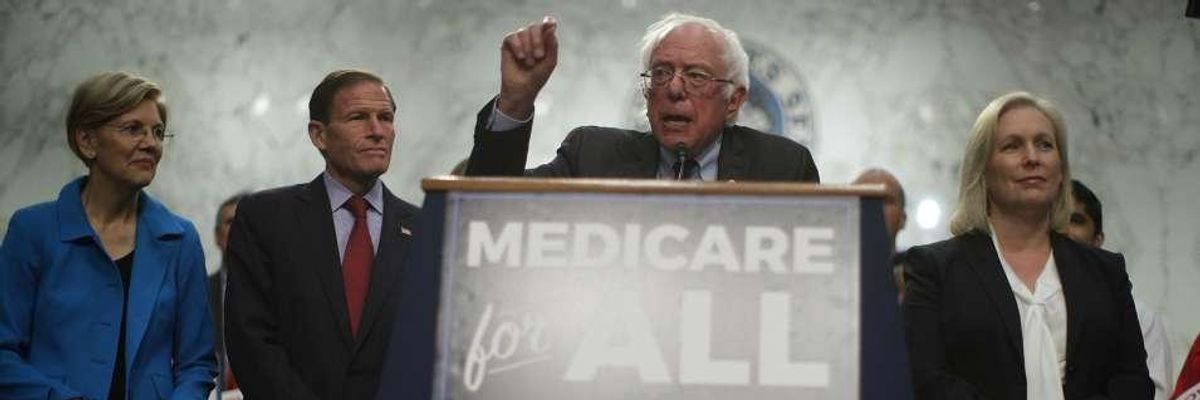Sanders announced his Medicare for All bill on Wednesday, surrounded by co-sponsors including Sens. Elizabeth Warren (D-Mass.), Richard Blumenthal (D-Conn.), and Kirsten Gillibrand (D-N.Y.). (Photo: Alex Wong/Getty Images)
New analysis shows that while Sanders himself gets zero from health insurance industry, co-sponsors of his bill receive half as much as those who remain on the sideline
A close look at the finances of 31 members of the Senate Democratic caucus who have yet to publicly back Sen. Bernie Sanders's Medicare for All bill shows they have received significantly more financial contributions from the health insurance industry than those who did sign on as co-sponsors ahead of its introduction on Wednesday.
An analysisby the government watchdog MapLight, released Thursday, found that senators who didn't back the bill received an average of $55,000 in industry donations since 2010, more than twice the average amount received by the bill's 16 co-sponsors. Sanders is the only senator who's received $0 in donations from the health insurance industry, which would eventually become obsolete under the senator's plan to make government the single payer of the nation's healthcare costs--the same kind of system that exists in other high-income nations, with better health outcomes and lower costs according to the independent foundation The Commonwealth Fund.
Out of all the Senate Democrats, Sens. Gary Peters (D-Mich.), Ron Wyden (D-Ore.), and Chuck Schumer (D-N.Y.) have received the most donations from health insurance companies, each gathering more than $130,000 in contributions from the industry since 2010. None have supported Sanders's plan, even though a spokesperson for Schumer said this week, "Democrats believe that healthcare is a right for all."
In a segment that aired Wednesday night, hosts at "The Young Turks"--Ana Kasparian, Jimmy Dore, and Ron Placone--offered another close look at some of the Democrats who have so far decided not back Sanders's Medicare for All bill:
Some of the Democrats who haven't backed the bill have said they wanted to push their own plans to extend healthcare to more Americans, including Sen. Sherrod Brown (D-Ohio), who received $50,000 from the insurance industry since 2010 and wants to reduce the eligibility requirement for Medicare to age 55.
But polls show that Democratic voters' views are shifting away from incremental changes to the healthcare system, in which costs are higher than in any other industrialized country, and towards a universal healthcare system. According to Pew Research, 60 percent of Americans said in June that the federal government should make sure all Americans have health coverage, while 33 percent favored a single-payer healthcare approach--up 12 points since 2014.
Our work is licensed under Creative Commons (CC BY-NC-ND 3.0). Feel free to republish and share widely.
Julia ConleyJulia Conley is a staff writer for Common Dreams.
A close look at the finances of 31 members of the Senate Democratic caucus who have yet to publicly back Sen. Bernie Sanders's Medicare for All bill shows they have received significantly more financial contributions from the health insurance industry than those who did sign on as co-sponsors ahead of its introduction on Wednesday.
An analysisby the government watchdog MapLight, released Thursday, found that senators who didn't back the bill received an average of $55,000 in industry donations since 2010, more than twice the average amount received by the bill's 16 co-sponsors. Sanders is the only senator who's received $0 in donations from the health insurance industry, which would eventually become obsolete under the senator's plan to make government the single payer of the nation's healthcare costs--the same kind of system that exists in other high-income nations, with better health outcomes and lower costs according to the independent foundation The Commonwealth Fund.
Out of all the Senate Democrats, Sens. Gary Peters (D-Mich.), Ron Wyden (D-Ore.), and Chuck Schumer (D-N.Y.) have received the most donations from health insurance companies, each gathering more than $130,000 in contributions from the industry since 2010. None have supported Sanders's plan, even though a spokesperson for Schumer said this week, "Democrats believe that healthcare is a right for all."
In a segment that aired Wednesday night, hosts at "The Young Turks"--Ana Kasparian, Jimmy Dore, and Ron Placone--offered another close look at some of the Democrats who have so far decided not back Sanders's Medicare for All bill:
Some of the Democrats who haven't backed the bill have said they wanted to push their own plans to extend healthcare to more Americans, including Sen. Sherrod Brown (D-Ohio), who received $50,000 from the insurance industry since 2010 and wants to reduce the eligibility requirement for Medicare to age 55.
But polls show that Democratic voters' views are shifting away from incremental changes to the healthcare system, in which costs are higher than in any other industrialized country, and towards a universal healthcare system. According to Pew Research, 60 percent of Americans said in June that the federal government should make sure all Americans have health coverage, while 33 percent favored a single-payer healthcare approach--up 12 points since 2014.

